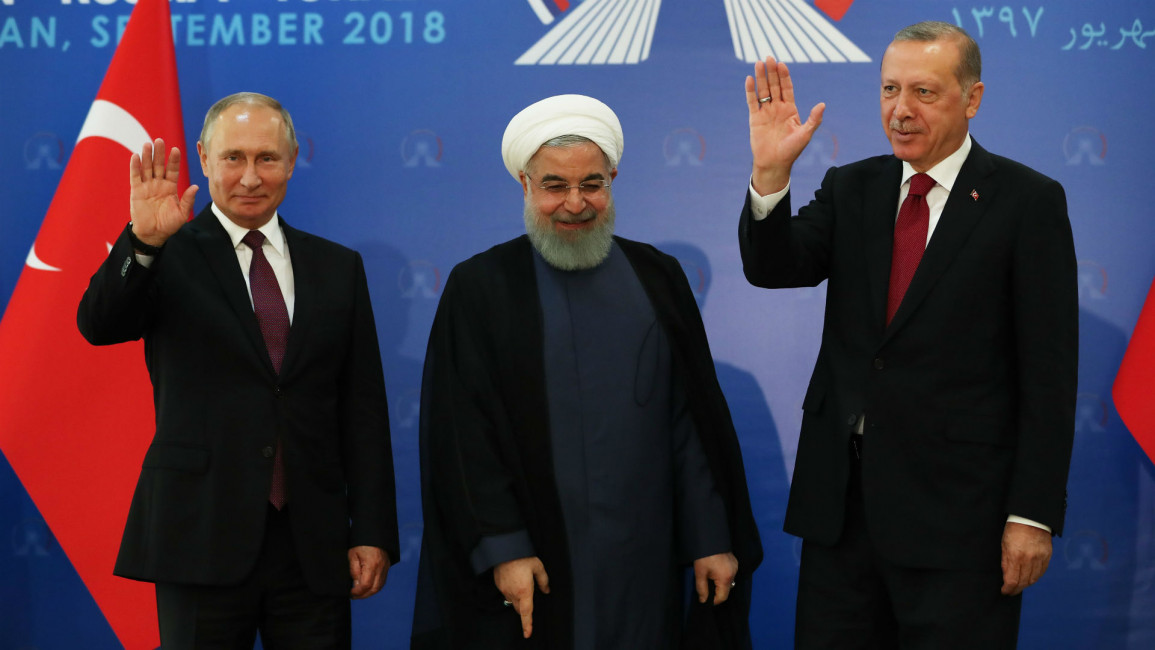Tehran summit: Putin defends Syrian regime's expected 'bloodbath'
"The legitimate Syrian government has a right and must eventually take under control all of its national territory," Putin told Iran's Hassan Rouhani and Turkish leader Recep Tayyip Erdogan at the summit on Friday.
The statement came despite the inability of Syria's President Bashar al-Assad to exert control in many areas of the country without huge military and paramilitary support from Russia and Iran.
The north-western province of Idlib, in which thousands of Syrians forced to flee their homes elsewhere in the country have found shelter, is the final stronghold of opposition rebel fighters backed by Turkey, while Kurdish groups hold much of the country's north-east.
The Russian leader said it was important to begin work on a political settlement in Syria "as soon as possible" and urged Iran and Turkey to ramp up coordination between their countries' foreign and defence ministries and security services and their counterparts in the Kremlin.
Read more: 'They are preparing to die': Aid groups say civilians preparing for the worst in Idlib
Putin said "terrorist elements" continued to "stage provocations" and use drones in Idlib. Assad and his allies have used the term "terrorist" to refer to any armed or unarmed opposition to Damascus' brutal rule since the uprising against him began in 2011.
"We cannot ignore this," the Russian president said. "We should solve this problem together."
The three leaders are expected to determine the future of Idlib amid growing fears of a humanitarian disaster. A full-scale military assault on the province has long been expected.
 |
Fighting terrorism in Idlib is an unavoidable part of the mission of restoring peace and stability to Syria - Hassan Rouhani |  |
The Iranian president, a staunch supporter of President Bashar al-Assad, concurred with his Russian ally, telling the summit: "Fighting terrorism in Idlib is an unavoidable part of the mission of restoring peace and stability to Syria.
"But this battle must not cause civilians to suffer or lead to a scorched earth policy," he added, amid UN warnings of a humanitarian disaster if an offensive goes ahead.
Iranian and Russian support for Assad has shored up the Damascus regime, allowing it to regain the upper hand in the seven-year civil war which has claimed some 350,000 lives since 2011.
While Russian missiles continued to rain down on Idlib on Friday, Turkey's President Erdogan called for a ceasefire in the besieged governorate.
Turkey, which has long backed Syrian rebels, fears the assault could prompt a flood of desperate Syrians towards its borders.
 |
Any attack launched or to be launched on Idlib will result in a disaster, massacre and a very big humanitarian tragedy - Recep Tayyip Erdogan |  |
"We never want Idlib to turn into a bloodbath," Erdogan told his Iranian and Russian counterparts on Friday.
"Any attack launched or to be launched on Idlib will result in a disaster, massacre and a very big humanitarian tragedy," he added.
"If we can ensure a ceasefire here, this will be one of the most important steps of the summit," Erdogan said.
"Idlib is of vital importance not only for Syria's future but also for our national security, as well as peace and stability in the region."
Earlier on Friday, a Turkish newspaper published what it claimed was Ankara's proposed plan to avert a crisis in Idlib. The proposal involved evacuating rebels into a buffer zone and training up a opposition security force in the governorate.
The three countries are guarantors of the so-called Astana process, a track of talks launched after Russia's game-changing 2015 military intervention which has eclipsed the Western-backed Geneva negotiations led by the UN.
Follow us on Twitter: @The_NewArab



